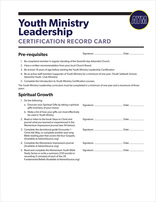 Answer: I wish there were a simple answer to your question, but there isn’t. If only I could say, “Talk about salvation,” or “The best topic is Christ’s death.” But people who talk about God vary, and so do unbelievers. And what you might talk about one moment may not be the best topic the next.
Answer: I wish there were a simple answer to your question, but there isn’t. If only I could say, “Talk about salvation,” or “The best topic is Christ’s death.” But people who talk about God vary, and so do unbelievers. And what you might talk about one moment may not be the best topic the next.What topics do you usually bring up when talking to unbelievers? Sports? The opposite sex? Hairstyles? Young people often talk about the latest media that’s impacted them—TV, video, DVD, music, Internet, MySpace, etc.
When you look at Jesus’ example, there’s not a one-size-fits-all way He talked with unbelievers. Look up these passages and see what topics or tactics Jesus utilized:
1. The rich young ruler (Luke 18:18-23).
2. The multitude (Matthew 5:1-16).
3. Nicodemus (John 3:1-21).
4. Zacchaeus (Luke 19:1-10).
5. The Pharisees and the man with the shriveled hand (Mark 3:1-6).
6. The woman at the well (John 4:5-42).
7. The demoniac (Mark 5:1-20).
8. The Pharisees (Matthew 23:15-28).
9. The woman who anointed Jesus’ feet (Mark 14:3-9).
10. Cleansing the Temple (Matthew 21:10-17).
Something I’ve noticed in these stories is that Jesus treats each person and each situation in a unique way. I think that means we can’t use the same formula all the time. Sometimes it’s better for us to take the initiative, as when Jesus talked to the woman at the well (John 4:7). At other times it’s better to listen first and then respond to what others say, as when Jesus responded to the rich young ruler (Luke 18:18-23).
I’ve noticed that sometimes Jesus stayed on the topic (Matthew 22:17-22), but at other times He cut to the core (see John 3:2, 3). He also seemed to go after those who weren’t very teachable (see Matthew 23—the whole chapter!). But have you noticed that Jesus often protected those who’d been beaten down by others (see Mark 14:3-9)?
When you take time to listen to others, they’re more apt to listen to you; it’s called “earning the right to be heard.” If you tell others about something they’re not ready to listen to, it’s like planting good seed in bad soil (Matthew 13:18-23) or throwing precious pearls to pigs (Matthew 7:6).
Ask the Holy Spirit to impress you with what to weave into your conversations with unbelievers. For example, when someone asks you what you do for fun, you can tell them about something you did with your youth group or your church. That brings up the topic of God and religious things without your saying, “You should go to church,” which actually might be the best response in another situation.
When Jesus sent out His disciples to announce His arrival, He told them, “Don’t be naive. Some people will impugn your motives, others will smear your reputation—just because you believe in me. Don’t be upset when they haul you before the civil authorities. Without knowing it, they’ve done you—and me—a favor, given you a platform for preaching the kingdom news! And don’t worry about what you’ll say or how you’ll say it. The right words will be there; the Spirit of your Father will supply the words” (Matthew 10:17-20, Message).*
If it’s not a time to defend yourself when you’ve been arrested for your alliance with Jesus, remember the counsel of Peter: “Be ready to speak up and tell anyone who asks why you’re living the way you are, and always with the utmost courtesy”
(1 Peter 3:15, Message).
*Texts credited to Message are taken from The Message. Copyright © 1993, 1994, 1995, 1996, 2000, 2001, 2002. Used by permission of NavPress Publishing Group.

















